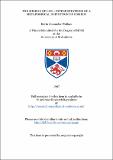The mirror of life : interpretations of a metaphorical definition of comedy
Abstract
Cicero's dictum, comoedia est imitatio uitae, speculum consuetudinis, imago ueritatis, as found in the prefatory essays to Donatus' commentaries on the Terentian comedies, has become accepted as the standard definition of New Comedy, without any external evidence as to the precise meaning. There are two possible interpretations: either the mirror is philosophical and it was comedy's main purpose to provide ethical instruction to its audience, or the mirror of comedy is realistic because it reflects the language, customs, and social values of the people. The issue is further complicated by the difference in objectives between the three main extant examples of New Comedy: Menander, Plautus and Terence, but also the differences in between the theory of comedy, and the actual practice. In the Renaissance, those playwrights who dutifully learned the Ciceronian-Donatian definition of comedy in their editions of Terence's comedies, were forced, when turning their hand to comedy themselves, to interpret the dictum in a practical way that would also reflect the age in which they were living.
Type
Thesis, MPhil Master of Philosophy
Collections
Items in the St Andrews Research Repository are protected by copyright, with all rights reserved, unless otherwise indicated.

